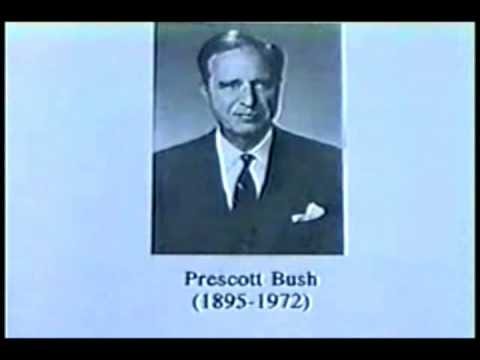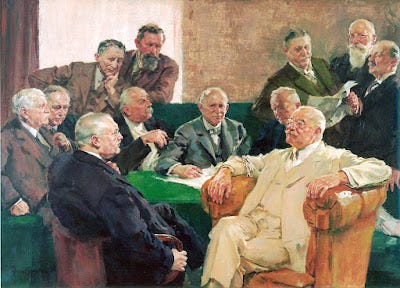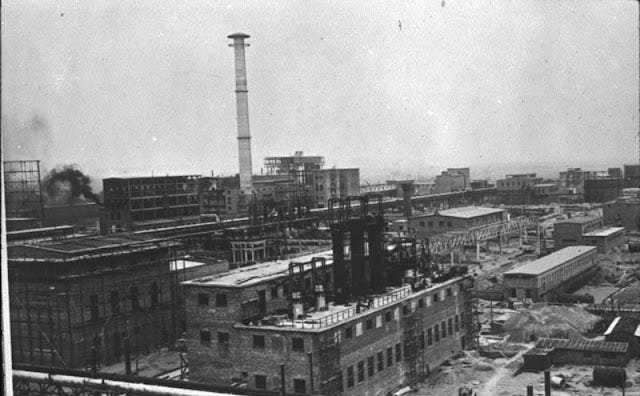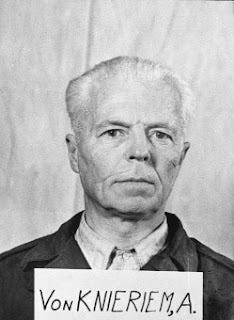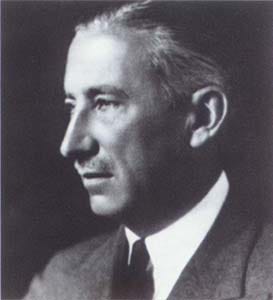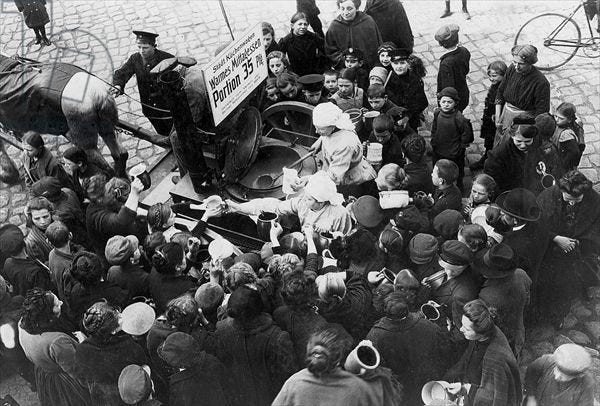The Borman Faction III, Rat der Götter by Jack Heart & Orage
First published Saturday, June 19, 2021, in the Human
Before 1933 when Hitler assumed power, not a single “god” among IG Farbens “council of gods” supported the National Socialist party. In fact, four of the twelve men making up the council that called themselves gods were Jews. (60) All of them knew full well it was Feder’s intention to eviscerate them once he and Hitler controlled Germany. Like the rest of Germanys industrialists IG Farben had their own man; 1926 winner of the Nobel Peace Prize Gustav Stresemann who came replete with his own party the German People's Party. Stresemann was married to the aristocratic Jewish beauty and famed socialite Käte Kleefeld.
Stresemann would serve as Germanys chancellor for 102 days in 1923 when the economy crashed, and France occupied the Ruhr. He would broker peace with France, for which he won the Nobel prize, and carry on as foreign minister and one of the most powerful men in Germany till 1929, when he expired suddenly at fifty-one of a stroke. His German People's Party (DVP) represented the interests of the great German industrialists. Their politics were right-wing liberal, and their platform stressed Christian family values, secular education, lower tariffs, opposition to welfare spending and agrarian subsidies and a hostility toward anything that even vaguely hinted at socialism. They had no use for the Weimar Coalition and only nominally even accepted that there was a German republic.
For the affections of Germanys elitists, the German People's Party was rivaled by the unabashedly right-wing German National People's Party under Alfred Hugenberg, more or less monarchists. Hugenberg would cut a short-lived deal with Hitler, until the enabling act enabled Hitler to get rid of him, to be Germany’s economic dictator. Like Gottfried Feder, Hugenberg was an adherent of Autarky, an economic system first postulated by early nineteenth century German American economist Georg Friedrich List. Much like Americas ex-president Donald Trump List advocated imposing tariffs on imported goods while supporting free trade of domestic goods. List stated the cost of a tariff should be seen as an investment in a nation's future productivity.
To List, laissezfaire was lunacy and Adam Smith anathema. List called Smith’s economics “the exchange-value system" and said they were really just another mercantile system ill-suited to the emerging industrial age of the nineteenth century. List put the good of the nation, which he defines as a given culture, before individuals, segments of the populace or even the entire population itself when it came to them engaging in acts beneficial to them but damaging to the nation’s future. Writing in the 1840’s in Pennsylvania, he prophetically uses slavery as an example of something wildly benefiting whole sections of the country but certain to end catastrophically for his newly adopted nation...*
National Socialism as articulated by Feder summed up the basis of Nazi employment creation measures as the “switch from the liberalistic-capitalist economy to a national economy striving toward rational (vernünftige) autarky”. (61) But this kind of closed economic space, no matter how rational, with import restrictions and bi-lateralization of trade was anathema to the globalist agenda of Rat der Götter or the Council of Gods.
Carl Duisberg was the chairman of both the Reich Association of German Industry and of the Advisory Board of IG Farben. He is pictured above in the famous 1926 portrait of the twelve gods with the white suit seated on the right at the forefront. He had come to Farben as the director of Bayer and was a student of the Rockefellers whose Standard Oil so greatly impressed him on a trip to America that he began enthusiastically lobbying for merger of Germanys chemical company’s immediately upon his return to Germany.
It was the villainous Duisberg that forced the use of chemical weapons during WW I. (62) In 1916, when Bayer managed to synthesize nitrates for the production of gunpowder for the German war effort, there weren’t enough people to work to implement Bayer's scientific breakthrough. Duisberg had a very simple solution. They would make Belgium Bayer's slave colony. There were sixty thousand Belgians loaded up on transport trains to be shipped as goods to Bayer, but German ethics prevailed, and the policy was halted to Duisberg’s dismay. Undaunted, that same year, our hero had Wilhelm Groener, one of the most powerful men in Germany removed from his position. Groener had been appointed by General Ludendorff to reduce inflation. Groener had pointed out the obvious. Germanys chemical companies, which were profiting wildly, could easily absorb the increased costs...
Duisberg, who would be gracious enough to die in 1935, always made it abundantly clear that he was opposed to any attempts at disrupting Germany’s participation on the world market. Although he advocated a customs union of central and southeast European states, he warned that to focus too much on the latter region would damage Germany's overall trading position. To Duisberg it made “little economic sense to endanger 96.6 per cent of our exports just to ensure 3.4 per cent.” (63)
There is evidence that IG Farben made "secret contributions" to the National Socialist party in 1931 and 1932. (64) By 1933 the support of IG Farben would end up being the "largest single contribution" to National Socialisms successful election campaign. (65) When National Socialism as it was represented to them by Feder finally did assume absolute power in accordance with the electoral vote of the German people and with the passage of the enabling act in 1933 if Duisberg, the Anti-Feder, wasn’t in Germany’s driver’s seat, he was riding shotgun right next to Hitler. Feder along with the wishes of the German people were under their wheels...
Under Feder’s National Socialism, WW II never would have happened. At the end of his book Feder anticipates international finance will oppose the legal institution of National Socialism in Germany: “with all the means Standing at its disposal, characterize such a procedure as an unprecedented crime against cultured mankind, it will, through its own devoted press with all possible lies and distortions, raise the so-called civilized world against such an unprecedented breach of undertaken obligations, it will speak of the complete collapse of Europe, and it will attempt to incite France as the especially suited bearer of European civilization to an open war against Germany.” (66)
But Feder expresses his doubts: “Whether, in general, a military power would take on such an enterprise in the Service of the financial power is therefore still very questionable.” (67) Feder expects no military conflicts, and never would have been suckered into invading Poland like Hitler because he knew that was just the type of move the bankers needed a National Socialist Germany to make to get a military power involved.
His plans involve no military buildup and only passive resistance like Germany used when France occupied the Ruhr in 1923. He clearly states that the notion that France will invade Germany because she is bankrupt is a joke, no state has ever invaded another state on such a premise. Besides German debts will be paid in cash. Feder writes: “Now our measures do not at all foresee the annulment of these internal German state debts, but only the cancellation of interest and the transformation of the bonds into bank assets. The cash payment can, on the other hand, be immediately offered to the foreign creditors.
How is it possible that in such a case, that is, when Mr. X. Illinois or Chicago receives the information from his banker that the German government is paying back the war bonds in cash and that this amount has been credited to his account, he would be very angry and set his government in motion against Germany?” (68)
Feder summarizes: “In this battle it is only a matter of maintaining iron nerves and not allowing oneself to be frightened by the howl of the press coolies who are maintained by high finance. The Jew will conduct this battle with the most tenacious doggedness, for it is a matter of “his honour” as the old Rothschild said: “My money is my honour, and one who takes my money takes away my honour from me...” (69)
Feder should have considered those words more carefully but then again Feder was a mathematician, a man of numbers. No doubt Hitler knew war was coming which is why he figured he could trade in Feder and all his enemies for Schacht and make them friends.
War would enable corporations like IG Farben and Standard Oil to merge and swallow up not only each other but nations. War is what Baron de Rothschild, Max Warburg, Paul Warburg, Bernard Baruch, and various other as of yet unmentioned Jews, needed to carve out a piece of prime real-estate from the middle east and call it their promised land. Most of all the Free Masons wanted war. They would need three to usher in the new aeon. This would be the second.
IG Farben, The Rockefellers & The NWO - YouTube (Sorry for Alex yelling schtick)
August von Knieriem was IG Farbens lawyer. Colloquialisms aside, Knieriem was Duisberg’s trained viper. He specialized in antitrust law and supervised the six-company merger that would become IG Farben. He prospected for six years as a deputy board member till 1932 when they made him a full member and he became a god. He would remain on the board presumably till being arrested by the Allies. In thirty-seven he pretty much took over all IG Farbens clandestine enterprises when he became chairman of its Legal Affairs Committee.
It was Knieriem who negotiated with the Wehrmacht to establish production of what they needed to prosecute their war with the world, which of course meant slave labor. Seemingly just for kicks so he could sit in on the tests Knieriem sat on the board for Anorgana, a subsidiary of IG Farben charged with the production of Tabun.
Tabun was one of the three ‘next generation’ nerve gases the Germans developed but never used. Sarin and Soman being the others... (70)
Two months before Obergruppenfuehrer Scheid met with leading German industrialists at the Hotel Maison Rouge, Knieriem began developing the story to be told to the victorious Allies about IG Farben and Standard Oil. In their dealings with each other, both corporations had been committing treason against their respective countries for years and it was already being talked about in America. In fact, just from what was known of their prewar dealings with IG Farben by 1944 Standard Oil was already being accused of treason. One of the directors; R. T. Haslam had little enthusiasm for being hung. He published an article in The Petroleum Times at the end of 1943 titled Secrets Turned Into Mighty War Weapons.
Haslam had spun it for the American primitives still without the benefit of a Walt Disney movie about globalism how Standard Oil had won the war for them. The bumbling Germans had, without getting anything in return for them, just showered Standard Oil with their secrets. Which of course Standard Oil used against them in the war effort. In an IG Farben memorandum boldly marked secret at the top and dated June 6, 1944, Knieriem addresses his fellow gods on the board of directors about what they will say considering what Haslam has already said.
In the damage control memorandum Knieriem hisses: “The cooperation between IG Farben and Standard, initiated in 1927 and extended in 1929, was laid down in extensive agreements resulting from negotiations over a number of years.” (71) He makes it clear that it is the directorship of IG Farbens position that “the Americans were ahead of us in their knowledge of the quality requirements that are called for by the different uses of motor fuels,” information vital in Germanys ability to wage war.
Knieriem points out that Haslam’s article seems oblivious to the fact that IG Farben could and was producing fuel for Germanys war machine: “on an industrial scale” from coal. Therefore, the hydrogenation process by which Germany extracted hundred plus octane fuel from coal had nothing to do with Standard Oils new found expertise in extracting what Knieriem calls “aromatics,” to produce hundred plus octane gasoline. Knieriem insists that they will insist: “specialized information was not turned over to the Americans.” “The Americans learned nothing from us...”(72)
But of course, Knieriem was lying. He is a lawyer and that is what lawyers do. The corporations had been merged at least since 1929 when for a block of Standard Oil stock worth thirty-five million in 1920’s dollars, I.G. Farben transferred rights to the hydrogenation process outside of Germany to a jointly-owned Standard Oil/I.G. Farben company. Knieriem boasts that the Americans learned nothing of IG Farbens Buna process by which Germany produced synthetic rubber from coal. In fact, at the behest of Knieriem; Frank Howard, the vice president of Standard Oil, did everything he could to hinder American development of synthetic rubber.
Strangely enough in the memo Knieriem doesn’t seem worried at all about Germany’s impending defeat, only that IG Farbens relation with Standard Oil not be blamed for it. He needn’t have worried about Americas wrath. He and the rest of IG Farbens board were going to kangaroo court, Rockefeller style. The Subsequent Nuremberg Trials, as opposed to the International Nuremberg Trials concluded in 1946, were held from forty-six to forty-nine before an American Military Tribunal as opposed to the Nuremberg Trials International Military Tribunal. The farcical trial for IG Farben was held in the summer of forty-seven as part of the Subsequent Nuremberg Trials.
Their leading role in building and maintaining Germanys war machine and penchant for using slave labor after the war began to do it were ignored. In modern Germany, Duisberg is a respected name in academics and philanthropy, much like the Rockefellers in America. At Nuremberg, the Americans whitewashed IG Farbens institution in Poland during the war of Duisberg’s innovative plans for the Belgians twenty-five years earlier. In June of 1942 with the admission of six hundred “inmates” IG Farben opened the doors to its very own concentration camp on its factory grounds in Monowitz, Poland right next to a place called Auschwitz. The camp; Auschwitz III or Buna/Monowitz, reached its maximum occupancy of over eleven hundred prisoners in July 1944.
None of it mattered, it never did. Five months after the verdict the judge would file a dissenting opinion, but nothing changed. The tribunal ruled Farbens policy of using slave labor necessary under the circumstances of the war. Although they were unavoidably held accountable for Auschwitz III, no one even got ten years let alone hung for it. Of the twenty-four defendants arraigned thirteen were found guilty on one or the other counts of the indictment and received light prison terms from one and one half to eight years, including time already served which allowed at least two of them to walk out the front door after being sentenced. Everyone was pardoned by 1951. Knieriem along with nine other defendants was acquitted outright of all charges.
Josiah DuBois, the lead prosecutor, a smug American from Camden New Jersey, got a rude awakening as to how globalism really worked. His head was still reeling from the trial and his legal smackdown when he wrote a book titled; The Devils Chemists. At the trial Knieriem had underplayed the fact that he had more legal credentials than anyone there including the judge, and referred to himself as Mr. instead of doctor as his academic achievements dictated, just a poor old country boy in route to conquering the world.
When DuBois asked him: “Did you have anything to do with this “marriage,” as I might call it, between Standard Oil and Farben?” Knieriem answered: “Yes, I had a very important part in the negotiations. I was in America for weeks at a time.” (73) When DuBois asked him why Farben never gave Standard the Buna process Knieriem blames American patent laws. DuBois is incredulous remarking in the book that Farben also received “Standards secret military formula for making tetraethyl lead, the indispensable component for making aviation gasoline” (74) for the Luftwaffe.
DuBois alleges that Knieriem personally finagled a five-hundred-ton loan of tetraethyl from another firm called the American Ethyl Company and twenty-million 1930’s dollars in fuel, mostly aviation gasoline, from Standard for just that purpose. Among Knieriem’s many duties he also “handled the legal aspects of the thirty-six “Shadow” factories subsidized by the Wehrmacht but owned and operated by Farben.” (75)
Shadow factories were by then already IG Farbens favorite trick. Protecting Farben and its illustrious founders like Duisberg and Nobel Laurette Carl Bosch’s name was a priority for Rat der Götter, regardless of who won the war. Although it is inconsequential because Hitler refused to use such weapons, DuBois also accuses Knieriem of manufacturing mustard gas for the Wehrmacht in shadow factories he personally owned through Farben. At the trial Knieriem just shrugged it off insisting he didn’t know what dichlordiethylsulphide, the euphemism for mustard gas used on the written documentation produced by DuBois, even was. He theatrically stuttered as he tried to pronounce it.
DuBois tenor toward Knieriem in the book can only be described as awe struck. Knieriem is Sherlock Holmes Moriarty. As DuBois goes on to say: “The western hemisphere thought that Krupp von Bohlen was the rearmer of Hitler. It might be fortunate, thought the attorneys, that Ivy Lee [an American publicity expert and a founder of modern public relations] had failed to make Farben a household name.” (76)
The initial thirty-five-million-dollar deal to transfer the rights to the hydrogenation process outside Germany did not expressly allocate rights to petrochemicals. A second agreement was made in 1930 called the Joint American Study Company or JASCO. In this agreement, Farben retained rights to its discoveries in Germany. Otherwise, each company had a 5/8 interest in discoveries. I. G. Farben contributed all the initial patents to JASCO.
During the last days of September 1939, Knieriem met with Howard at the Hague in Holland where they plotted how they would prevent America from seizing IG Farbens patents. DuBois writes: “Within twenty-four hours all the JASCO patents were transferred to Standard Oil. Farben agreed to also put in Standards custody the “experience” for making goods with no wartime use. Perhaps Howards previous blocking of crucial industrial developments in the United States was unwitting: now he deliberately accepted, in friendly trust, the power to prevent the United States from seizing the Farben patents. Standard Oil even agreed to hold Farbens profits till after the war. This agreement was in a secret memorandum signed by Howard and left with Farben, according to which Farben could revoke the whole deal at any time...” (77)
After the trial Knieriem would become Chairman of the Supervisory Board of "I.G.-Farben-Industrie AG i. L." in Frankfurt am Main. He would quietly rebuild BASF, now the largest producer of chemicals in the world, live to see both Kennedys assassinated and die in the early seventies. In 1951 what remained of IG Farben in the West was split into its six constituent companies, then again into three: BASF, Bayer, and Hoechst. These companies continued to operate as an informal cartel and played a major role in the miraculous economic recovery of West Germany. Following several later mergers, the main successor companies are Agfa, BASF, Bayer, and Sanofi in France.
The patents had been saved and therefore the autonomy of IG Farben if not Germany. Rat der Götter would rise from the dead and dozens of shadow companies, mostly pharmaceutical, would rise with them. For now on, no one would ever take another aspirin or any other kind of medication without paying the holders of those patents. No one ever again would purchase oil or any oil byproducts without paying the holders of those patents. And finally, two more German lawyers; Walter Hallstein and his Nazi sidekick Carl Ophüls would parlay those patents into the European Union and IG Farben would rise again as Count Coudenhove-Kalergi’s Pan Europa...
*“Contrary to what Global Market proponents postulate, Autarky is not a relic of the past. It is a modern way of answering challenges of Empire, and not be susceptible to blackmail, having to bend the knee for core needs of one’s population. Born out of a response to the naval Blockades like the British Hunger Blockade of Germany 1919 to force signage of the unjust Versailles Treaty, American forces by order of Roosevelt cutting off Japanese energy supplies prior to Pearl Harbor, sanctions against modern Russia for claimed annexation of Crimea or Iran out of decades long embargo developing a very potent drone and missile program.
So what does the concept of self-sufficiency aka Autarky bring to the table today?
It depends on the situation of a given country. Modern Russian thought following the Ukraine affair and Crimea was to implement and give land grants to farmers, making it a matter of National pride to produce healthy, organic GMO-free food for its citizens. Russia is well positioned with its natural resources in the vast country, not unlike the US, in that regard but with self-inflicted wounds at the altar of Global Supply chains, where labor is cheapest, no oversight or environmental restraints and exploitable. It lost its skilled workforce by outsourcing and shifting to borderland Mexico and China.
Even following the Globalists own narrative of Global Warming, producing close to home saves a lot of CO2 emissions. Does it make sense to ship across the Pacific all nuts, bolts, washers needed to assemble anything? (1) (2)” - Orage
1 - Major Gilda a., Jackson, USMC. "Strategic Material-U.S. Vulnerability." GlobalSecurity.org. Military, 1988. Web. https://www.globalsecurity.org/military/library/report/1988/JGA.htm
2 - BUILDING RESILIENT SUPPLY CHAINS, REVITALIZING AMERICAN
MANUFACTURING, AND FOSTERING BROAD-BASED GROWTH
100-Day Reviews under Executive Order 14017 https://www.whitehouse.gov/wp-content/uploads/2021/06/100-day-supply-chain-review-report.pdf
The Bormann Faction, part I by Jack Heart & Orage
The Bormann Faction Part II by Jack Heart & Orage
Citations
60 - Bäumler, Ernst (1988). Die Rotfabriker: Familiengeschichte eines Weltunternehmens (Hoechst) (in German). Munich and Zürich: Piper. ISBN 978-3-492-10669-6.
61 - Hans-Erich Volkmann, “Das außenwirtschaftliche Programm der NSDAP 1930-1933”, Archiv für Sozialgeschichte, 17 (1977), p.255.
62 – Kordula Kühlem (Hrsg): Carl Duisberg (1861-1935): Briefe eines Industriellen. Band 68 von Deutsche Geschichtsquellen des 19. und 20. Jahrhunderts, Oldenbourg Verlag, 2012, ISBN978-3-486-71283-4
63 - Herbst, Ludolf “Der Krieg und die Unternehmensstrategie deutscher Industrie-Konzerne inder Zwischenkriegszeit” in Martin Broszat, Klaus Schwabe (eds), Die deutschen Eliten und der Weg in den Zweiten Weltkrieg (Munich, 1989), p119.
64 - Sasuly, Richard (1947). IG Farben. New York: Boni & Gaer.
65 - Borkin, Joseph (1978). The Crime and Punishment of IG Farben. New York, London: The Free Press, division of Macmillan Publishing Co. ISBN 978-0-02-904630-2.
66 – Feder, Gottfried. Translated with a Preface by Alexander Jacob, The German State on a national and socialist foundation. A World View Foundations Project wvfoundations.org, 1923. p158. Web. Gottfried Feder : Free Download, Borrow, and Streaming : Internet Archive.
67 – Ibid, p163.
68 – Ibid, p160.
69 – Ibid, p156.
70 - Heart, Jack and Orage . "MK Ultra – Cybernetic Mutation, Remote Controlled Slaves, Dragon Soldiers and a Zombie Empire; Paint it Blue." The Human: Jack, Orage & friends. Jack Heart writings. 2016. Web. https://jackheart2014.blogspot.com/2020/04/mk-ultra-cybernetic-mutation-remote.html
71 - (1944, June 6). TRANSLATION OF DOCUMENT NI-10551 PROSECUTION EXHIBIT 994. IG Farben memo detailing cooperation with Standard Oil. Retrieved from http://www.tuks.nl/docs/IG%20Farben%20memo%20detailing%20cooperation%20with%20Standard%20Oil.pdf
72 – Ibid.
73 – DuBois, Josiah and Edward Johnson. "The Masters Conquer." The Devils Chemists. Boston: The Beacon Press, 1952. p278. Web. http://www.profit-over-life.org/books/books.php?book=23&pageID=286&expand=no
74 – Ibid.
75 - Ibid, p280.
76 – Ibid, p282.
77 – Ibid, p283.

